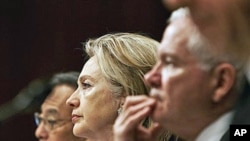The New Strategic Arms Reduction Treaty (START) was signed last April by U.S. President Barack Obama and his Russian counterpart, Dmitry Medvedev. It provides for modest reductions in long-range nuclear weapons on both sides, as well as limits on so-called delivery systems - intercontinental ballistic missiles, submarines and bombers. The treaty also updated verification procedures to make sure that neither side cheats on the provisions of the accord.
The Obama administration has made U.S. Senate ratification of the New START agreement a key element of its foreign policy. Last September, after numerous hearings, the Senate Foreign Relations Committee approved the pact and sent it to the full Senate, where 67 votes are needed for final approval. Just a few days ago, President Obama urged the Senate to approve the treaty before the end of this year.
This means the administration hopes for ratification during the so-called "lame duck" session of Congress - before the new Congress begins its work in January. The treaty also must be ratified by the Russian parliament.
During the recent midterm elections, Republicans "shellacked" the Democrats - a word used by President Obama. They took over control of the House of Representatives and gained enough seats in the Senate to cut into the Democratic majority.
The treaty is supported, among others, by Republican Senator Richard Lugar, the top Republican on the Foreign Relations Committee. He is trying to work with his colleagues in an attempt to get the necessary votes for passage. But some Republicans are opposed to the pact, saying it hinders U.S. plans for a missile defense system. Proponents say missile defense was not an issue addressed by the New START treaty.
Analysts say there is better than a 50/50 chance the treaty will be ratified during the lame duck session. Robert Legvold of Columbia University said, however, that if senators adopt amendments to the accord, that would force Russian lawmakers to do the same "and that kind of tit-for-tat could well sink the treaty."
Max Bergmann, a policy analyst at the Center for American Progress, said the key question is "whether the Republican leadership will do everything they can to stop this from coming to the floor. And if they are going to do that, will the Senate leadership on the Democratic side, do everything they can to force a vote."
Bergmann said, "It's a test for Republicans to see if they can actually govern the country, if they've matured enough beyond the direct opposition to Obama."
Some analysts say there are enough moderate Republicans who will vote to ratify the treaty. Legvold said the new START agreement has become a "bargaining chip used by those who are not in the end opposed to the agreement, but used in order to create leverage by which they can press the administration to deliver on defense spending, particularly modernization of nuclear forces."
Many experts said if the current session of Congress does not address the new START treaty, it would be far more difficult to ratify it during the next full session of Congress that convenes in January.
"What happens in the next session," said Bergmann, "is that you'll have to start the whole process all over again."
The treaty would have to go back to the Senate Foreign Relations Committee and more hearings will need to be held. "And the Senate math" said Bergmann "has also dramatically changed so that the level of bipartisan support you need in the next session would be far greater."
Political experts also said failure by the Senate to ratify the new treaty would be a serious blow to U.S.-Russia relations. Legvold said that's because "it will demonstrate to the Russian side that Obama can't deliver on some important elements, which will raise further questions about how effective he can be in pursuing a policy that they now believe is positive, that they are now pleased with, but probably don't feel they can count on."
Legvold also said a treaty failure in the Senate would also be a blow to Russian President Medvedev "because he has advertised this new improvement in U.S.-Russia relations as a major accomplishment for which he is taking credit."
Legvold said the current positive momentum in the relationship between Washington and Moscow could begin "reversing itself if there were a number of setbacks and this [Senate non-ratification] would be a significant setback."
Fate of New START Treaty Uncertain After US Elections




